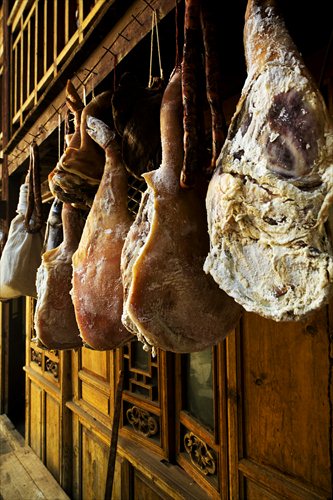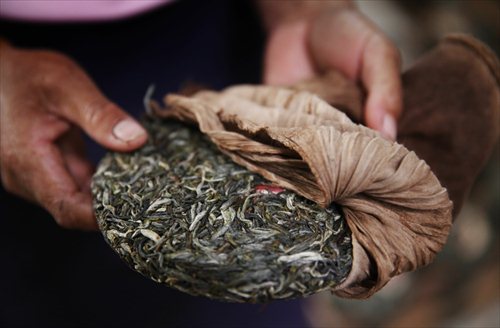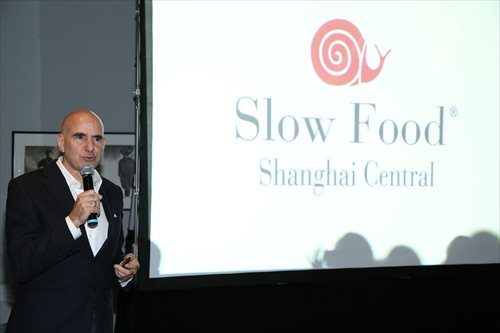Taking it slow
Shanghai joins in preserving food and gastronomy heritage
Italy-headquartered Slow Food, an international movement aimed at preserving local foods and gastronomy traditions, recently brought its Ark of Taste initiative to Shanghai in the hope of promoting biodiversity.
The Ark of Taste aims to preserve and promote quality regional food and cuisine by listing endangered items in the categories of fruits, vegetables, animal breeds, cheeses, breads, sweet and cured meats.
Select to protect
Among the 2,000-plus products from 125 countries that have made it in to the catalogue, only three are from China - Mountain Forest Pu'er Tea, Suan Cha (sour tea) and Heqing Ham - all of which come from Yunnan Province. Antonio di Stefano, who manages Slow Food's international department, said the initiative aims to select 100 more products from China to reflect the country's vast territory.
"The criteria for inclusion are that they are distinctive in taste, endangered, and strongly linked to local production," said di Stefano.
Everyone is welcome to nominate a product. Taking a plant for example, one would be expected to describe its shape, weight, color, taste, and how and when it is harvested. It would also be helpful to mention if it is a specific variety, linked to the territory, and whether it is propagated with local seeds.
In the case of an animal breed, one can describe the animal's characteristics, in terms of size, shape of horns, color of hide or fur, and for which purpose it is bred. Products derived from it should also be indicated.
The actions taken to protect these listed products differ. For some, it means encouraging people to buy and consume, telling their stories and supporting their producers. For endangered wild species, it might mean eating fewer of them in an attempt to increase stocks.
Di Stefano said Slow Food will be displaying a selection of ingredients and products from China at the Milan Expo in October to represent the country's culinary treasure.
Local campaigns
Valtero Canepa leads Slow Food Shanghai, which currently has 20-plus volunteers. The group aims to be friendly and welcoming, just like around 1,000 similar groups across the world.

Heqing Ham from Yunnan Province

Mountain Forest Pu'er Tea from Yunnan Province

Valtero Canepa of Slow Food Shanghai Photos: Courtesy of Istituto Italiano di Cultura Shanghai and CFP
Canepa said Slow Food chose Shanghai as a base because the city's residents are already receptive to the movement's ideals.
"In this international city, there is already a large population that knows, understands, and supports the Slow Food culture," Canepa said. "Such people, with relevant knowledge, would help greatly in further promoting Slow Food in the region."
One of Slow Food Shanghai's key strategies lies in educating children. By inviting them to partake in the processes of creating and enjoying food, from hand-picking ingredients to home-cooking, the team tries to introduce good and clean consuming habits from a young age.
The team is also planning to run an orchard project at local schools, and publish a Chinese edition of Slow Food's materials for students to read.
Di Stefano pointed out that educating consumers is crucial as it allows them to make informed decisions about what foods to buy and consume, and move away from relying on the large-scale industrial consumption that is the antithesis of the Slow Food movement. "Our daily consumption decisions can change the methods of production," he said.
Another strategy is linking consumers directly to producers. This includes organizing trips to organic farms in and around Shanghai, and inviting farmers to sell their products at various markets.
The next steps, said Canepa, are to implement a chef alliance, and cooperate with local gourmet and environmental protection associations.
Quality agenda
Di Stefano pointed out that the Slow Food movement is entering China at a time when food security and environmental and resource protection are high on the government's agenda.
Qiao Lin, CEO of Slow Food Greater China, said Slow Food's commitment to agricultural production in terms of protecting the environment, the interests of farmers and traditional processing crafts is meaningful to a country with a huge agricultural sector like China.
"Joining the global network of Slow Food is a good way to promote Chinese culinary culture, and moreover to learn from each other based on the mutual belief of 'good, clean, fair' food," Qiao said.
More information on the Slow Food project can be found at http://www.fondazioneslowfood.com/.